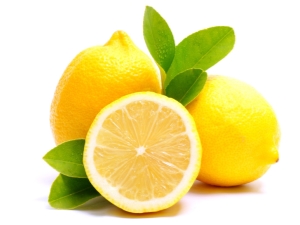How many calories are in a lemon and what is its nutritional value?

Lemon is an evergreen citrus tree from the rue family. The fruits of the plant are also called lemon. They have a bright yellow color, a characteristic citrus smell and a very sour taste. Such fruits are especially popular during the cold season and when losing weight, and from childhood they are familiar to absolutely everyone.
Peculiarities
The height of the lemon tree reaches about 6-8 meters. The fruits have an elongated oval shape, which tapers at both ends. The peel is dense, textured, yellow, about 5 mm thick, inside there is a white film layer, in which the light yellow pulp of the fruit is stored, divided into 10-12 slices. The smell of lemon is fragrant, citrus, invigorating. The taste is sour, astringent. It is usually not eaten in its pure form.

Nutritional value and calories
The calorie content of a lemon depends on its variety and other factors, we will give the average figures.
100 grams of lemon contains about 28 kcal. The average weight of 1 piece is 120-140 grams, therefore, it will contain about 35 calories.
BJU per 100 grams:
- proteins - 0.8 g;
- fats - 0.1 g;
- carbohydrates - 2.8 g.
The calorie content of 100 ml of water with the addition of a couple of teaspoons of lemon juice will be about 3 kcal.
That is why actively losing weight prefer this drink - in addition to helping in the fight against excess weight, it also speeds up metabolism, cleanses the walls of blood vessels and has a pleasant refreshing taste.
Due to its extremely sour taste, not many people can consume lemon in its pure form, usually using a sweetener in the form of sugar or honey.
The calorie content of 100 g of lemon with sugar will be about 172 kcal.
For those who like to drink tea with lemon jam, there is the following recipe. Since all vegetables and fruits lose most of their healing properties when boiled at a high temperature, it is better to do without cooking. It is necessary to pour over the lemons with boiling water, grate the zest on a coarse grater or cut the skin with a knife, setting it aside. Lemon peel also contains a huge amount of useful elements, essential oils with bactericidal properties.

Remove all seeds from the lemon pulp, cut it into cubes. Combine the pulp of the lemon with the zest and grind in a blender, add sugar in a ratio of 1: 1 to the resulting mixture. Mix everything thoroughly, put in a glass jar with a tightly screwed lid. Remove to infuse in the refrigerator for 3 days. The shelf life of the resulting jam is 6 months.
You will get a tasty, healthy, vitamin-rich delicacy that can be smeared on bread, crackers, added to cereals or tea. You can make a refreshing summer lemonade: pour clean cold water into a decanter, add 1/3 can of lemon jam, a couple of mint leaves and ice cubes. You will get a fresh fragrant lemonade that will perfectly quench your thirst in the summer heat and give you a boost of good mood.
Chemical composition
Lemon is extremely rich in vitamins and minerals. Due to its beneficial properties, it is an indispensable product in the season of colds. It has a lot of vitamin C, because of this, lemon was considered one of the main products, along with sauerkraut, which was used to treat scurvy (an acute deficiency of vitamin C in the body). Lemons are very rich in essential oils, pectins and bioflavonoids.
Consider the composition of the lemon in more detail.
Vitamins:
- FROM;
- RR;
- B1 (thiamine);
- B2 (riboflavin);
- AT 5;
- B6 (pyridoxine);
- BUT.
Macronutrients:
- calcium;
- magnesium;
- sodium;
- phosphorus;
- sulfur.
Trace elements:
- zinc;
- iron;
- manganese;
- boron;
- fluorine.


Benefit and harm
Lemon is one of the most useful and popular fruits, especially during the period of viral diseases, Its beneficial properties have a wide range of actions:
- has a general strengthening effect on the body;
- improves immunity;
- used to treat and prevent influenza;
- lowers cholesterol levels;
- stimulates the work of brain activity;
- replenishes vitamin C deficiency;
- is an active fat burner;
- has an antiseptic effect;
- improves bowel function;
- helps with nervous fatigue;
- is an effective remedy for nausea;
- treats aphthous diseases of the mouth and throat;
- improves appetite, digestion;
- provides prevention of stroke and diabetes;
- reduces the acidity of the stomach;
- cleanses the body of toxins.


There are also contraindications, lemon should be used with caution by people:
- having an allergic reaction to citrus fruits;
- children under the age of 3;
- pregnant and lactating women;
- suffering from gastritis and peptic ulcer.
If used frequently, lemon juice can damage tooth enamel, so use a straw whenever possible.
Lemons should be stored on the bottom shelf of the refrigerator or in a slightly cool, dark place. By no means in the freezer, otherwise they will become frozen and not so useful.
For information on how to drink water with lemon, see the following video.

















